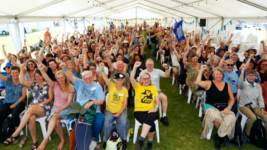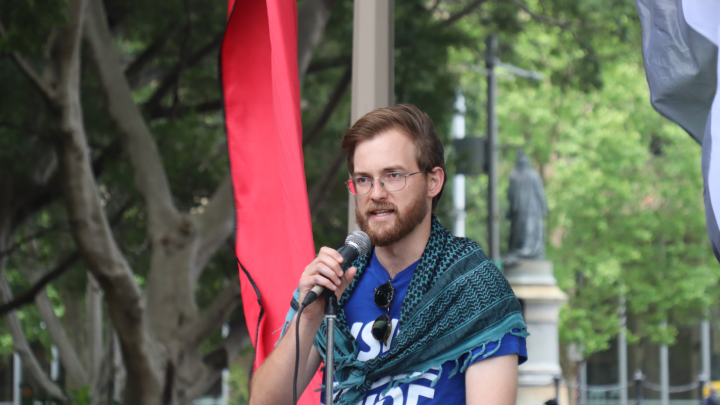NSW Authorities Impose Exclusion Zone in Attempt to Prevent Newcastle Coal Port Blockade

Transport for NSW (TfNSW) has done the bidding of the Minns government to impose an exclusion zone that will be established on the navigable waters of Newcastle Harbour, which provides passage to the regional city’s coal port, in an attempt to stop climate defence group Rising Tide from staging The People’s Protest of the World’s Largest Coal Port: an event that was to be staged over 50 hours.
The imposition of the zone is a drastic measure to prevent a protest that had not been authorised by NSW authorities, as instead of accepting the required Notice of Intention to Hold a Public Assembly or a Form 1, which must be lodged seven days prior to an event, NSW police commissioner Karen Webb had the document struck down by the NSW Supreme Court due to safety concerns.
Rising Tide was clear, however, that it would be pushing ahead with the blockade, as it understands that the rejection of a Form 1 results in the usual impunity that protesters have from being arrested by NSW police in regard to obstruction offences no longer holds. However, this does not actually prohibit an event, as citizens continue to have the right to protest at threat of arrest by police.
So, the notification of the exclusion zone that organisers received from TfNSW last Friday night was a further attempt to prevent the family-friendly protestival from going ahead. And this further attempt to supress Rising Tide’s weekend of protests on Awabakal Country further comes on the back of a close to 32 month bipartisan campaign to erode the NSW public’s right to protest in general.
Yet, despite all of this, the Rising Tide festival commenced on Tuesday as scheduled. And in a further attempt to have Labor backdown, climate protesters gathered outside NSW transport minister Jo Haylen’s office on Wednesday, calling on her to revoke the exclusion zone, which is set to take place from 5:00 pm on Thursday, 21 November to 8:00 am on Monday, 25 November 2024.
Antidemocracy in practice
“Theoretically, this means that anyone who enters the water at any point, at any depth, around the entire harbour will be in contravention of that section of the Act and could be charged,” Rising Tide organiser Zack Schofield told Sydney Criminal Lawyers.
“It’s an unprecedented overreach by government misusing the Marine Safety Act, which is meant to facilitate community events, not shut them down because the government can’t take criticism,” he continued. “They are happy to throw everything at us to silence us.”
The exclusion zone has been declared in accordance with section 12(2) of the Marine Safety Act 1988 (NSW). It provides that when a special event is taking place on a waterway, the minister can prohibit or regulate vessels on “specified navigable waters”. Schofield advises this is meant to facilitate events not ban them. And section 12(5) of the Act stipulates that a breach can incur a fine of up to $1,100.
TfNSW further notifies that NSW police and boating safety officers will be monitoring the zone and civilians are required to comply with their orders as per section 15A of the Marine Safety Act. And a failure to do so results in a fine of up to $3,300.
Rising Tide was only informed of these changes late on Friday, after a clear agreement had been reached between the Newcastle-based climate group and senior NSW police at a meeting the day prior, which entailed protesters agreeing to only enter the water close by the shore, leaving the shipping lane free.
Further the Rising Tide campsite was relocated on request of Newcastle City Council, after TfNSW pushed for this change, as the original site bordered TfNSW land and potential trespass was raised, despite the area not being enclosed.
Last week also saw council approve the People’s Protest music festival for the coming weekend, which is set to take place at Nobbys Beach, with a lineup that includes Peter Garret, Gurridyula and Dobby.
“In terms of the beach, I don’t believe there is any legal basis for them to be banning us from literally standing on the sand,” Schofield said. “But I don’t think that is going to stop them.”

Killing protests
In early 2022, nonviolent direct actions carried out in the name of climate by Fireproof Australia and Blockade Australia were gaining traction in the Greater Sydney region.
Along the eastern states, the Black Summer bushfires of 2019/20 had seen 20 percent of mainland forest burndown, while the massive rain bomb flooding events along the eastern seaboard of 2022, were just kicking in.
So, the Perrottet government passed a new antiprotest regime in April 2022, with the bipartisan approval of NSW Labor. This sees participants in unauthorised protests, or those without Form 1 ‘approval’, who obstruct a road, tunnel or bridge in Sydney, Newcastle or Wollongong, as well as at a long list of major facilities, facing severe penalties of up to 2 years gaol time and/or a fine of $22,000.
Since taking office, the Minns government has only shown itself to be a proponent of these laws, and further it’s started cracking down on authorised protests, as it targets the nonviolent weekly Free Palestine demonstrations on Gadigal Country in Sydney. And the police commissioner had an unsuccessful crack at ending the 52nd consecutive protest in the Supreme Court.
But following the 12 month anniversary march having successfully gone ahead, Minns spruiked the idea of permitting NSW police to cancel regular street marches for financial reasons, while NSW Liberal opposition leader Mark Speakman suggested a user-pays system, whereby protest organisers foot the bill for the saturation policing their now required to have at demonstrations.
The NSW police user-pays policing system requires event organisers that want to hire the services of NSW police having to pay $147.60 inclusive of GST an hour per officer, as of 1 July this year. The user-pays system was used circa 2018 ensure that certain music festivals that NSW authorities didn’t want to go ahead, were then priced out of the market.
Despite the formidable campaign against the NSW antiprotest laws, which has seen more than 240 civil society organisations call for it to be revoked, the Minns government released its statutorily required review of the regime last Thursday, which recommended letting the laws stand as they are because they serve as deterrent, and there will not be another review of them for three years.
And just for good measure, two days before the release of the suck-it-up news, NSW Labor introduced the Crimes Amendment (Obstructing a Railway) Bill 2024, which seeks to attach the draconian antiprotest regime fine of $22,000 to the offence of obstructing a railway, contrary to section 213 of the Crimes Act, as the offence only carries up to 2 years prison time right now.
The people united
According to Schofield many “mums, kids and families” might have been “scared off by the misuse of these laws”, however at this point in the climate emergency, it appears that the overreach the Minns government is now applying, will likely act as “a motivator” for “many more mums, kids and families” “to fight for their futures”. And this may not have been the case before the 2019/20 wildfires.
Rising Tide doesn’t consider the safety concern raised is valid, as, over the years, the same protest has been staged a dozen times. And last year’s event garnered global headlines, after 3,000 people launched the 30-hour blockade and over 100 people were then arrested by NSW police after remaining on the waterway for 2 hours after the time that was specified on the Form 1 had expired.
The coal exports running through Newcastle Harbour represent 1 percent of global emissions. Rising Tide is calling for an end to all new coal and gas approvals in Australia, along with a 75 percent tax to be placed on all fossil fuel exports, with the revenue then being used to fund community and industrial transition to renewables, as well as ending all coal exports from Newcastle by 2030.
As to the broader implications this latest attempt to supress the voice of climate dissent entails, Schofield considers it “a disgraceful attack on our foundational democratic rights”, which “sends a really clear message that the government does not care about young people.”
“In fact, they care more about protecting their corporate mates, than they care about democracy,” the climate activist said in conclusion.
“It is a cowardly response.”







